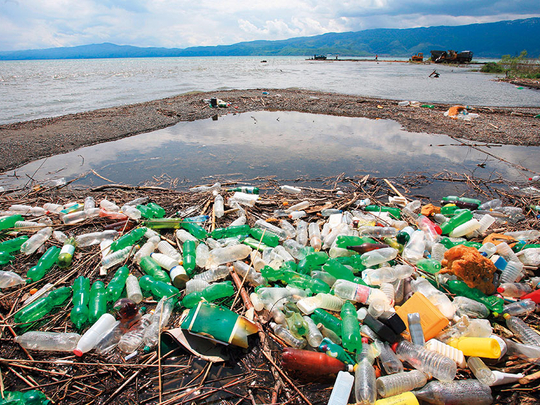
The world’s oceans are under the greatest threat in history and life in the seas risks irreparable damage from a rising tide of plastic waste, the United Nations has warned.
Lisa Svensson, the UN oceans chief, said governments, firms and individual people must act far more quickly to halt plastic pollution. “This is a planetary crisis,” she told the BBC, adding: “In a few short decades since we discovered the convenience of plastics, we are ruining the ecosystem of the ocean.”
Her comments came as thousands of delegates, including heads of states and ministers, assembled in Nairobi this week for the third United Nations Environment Assembly, that runs until today.
Delegates at the meeting have demanded tougher action against plastic litter, with the UN estimating that there were 480 billion plastic bottles in the world last year, a number that is expected to grow to 583 billion by 2021. This translates into roughly a million plastic bottles being bought around the world every minute.
More than half of the plastic polluting oceans originates from five countries: China, Indonesia, the Philippines, Vietnam and Sri Lanka, according to the research carried out in the US in 2015.
Delegates are expected to agree for the first time to take global action against plastic polluting the world’s seas, and environment officials hope ministers will agree to start developing measures to police marine litter management. They also want nations and regions to set individual plastic waste reduction targets for the first time.
Erik Solheim, executive director of the UN environment agency, describes the problem of marine pollution as “Armageddon in the making”.
Blue Planet 2
“We will have the same weight of plastic as fish in the sea by 2050 if this continues,” he told reporters. “It’s all over the place, even in northern Norway, hundreds of miles from human habitation.”
The damage being wreaked in seas around the globe by climate change, plastic pollution, overfishing and even noise is also the subject of the final episode of the BBC’s Blue Planet 2 series by Sir David Attenborough, to be aired on Sunday, December 10. The seas are a vital part of the global ecosystem, leaving the future of all life on Earth dependent on humanity’s actions, he says.
Previous BBC nature series presented by Attenborough have sometimes been criticised for treading too lightly around humanity’s damage to the planet. But the final episode of the latest series is entirely dedicated to the issue. “For years we thought the oceans were so vast and the inhabitants so infinitely numerous that nothing we could do could have an effect upon them. But now we know that was wrong,” says Attenborough. “It is now clear our actions are having a significant impact on the world’s oceans. [They] are under threat now as never before in human history. Many people believe the oceans have reached a crisis point.”
BBC executives were reportedly concerned about the series appearing to become politicised and ordered a fact-check, which it passed. The series producer, Mark Brownlow, said it was impossible to overlook the harm being caused in the oceans: “We just couldn’t ignore it — it wouldn’t be a truthful portrayal of the world’s oceans. We are not out there to campaign. We are just showing it as it is and it is quite shocking.”
Climate change
Brownlow said much of the footage shot of albatross chicks being killed by the plastic they mistake for food were too upsetting to broadcast. The programme also filmed on the Great Barrier Reef in 2016, witnessing the worst bleaching event in its history.
Climate change is causing ocean temperatures to rise, bleaching the corals vital as nurseries for ocean life, and waters are warming rapidly in Antarctica too. Jon Copley, from the University of Southampton and one of many scientists appearing in the final episode, says: “What shocks me about what all the data shows is how fast things are changing here [in Antarctica]. We’re headed into uncharted territory.”
Carbon dioxide from fossil fuel burning also dissolves in seawater, making it more acidic. Prof Chris Langdon, at the University of Miami, says it is “beyond
question” that the problem is man-made.












